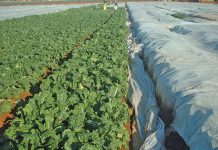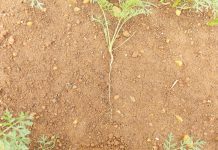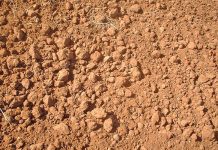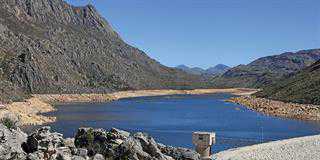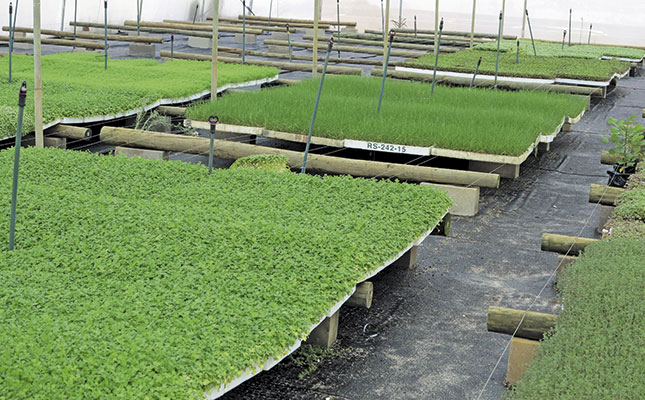
Photo: Jay Ferreira
Miki and Cathy Clark spent two years exploring the Western Cape in search of the right farm to buy. When they came across Weskuskraal, situated about 8km from Yzerfontein on the West Coast, they knew they had found it. And so begins the story of their success with small-scale herb production.
Although the tunnels were derelict, the buildings were sound, the infrastructure was comprehensive, and the couple saw great potential. Miki contacted the owner and they rented the farm for three years, purchasing it two years ago.
Weskuskraal is a 10ha property in the Jacobskraal Nature Reserve, and only 25% of the land may be farmed. Miki farms 1,2ha and has the equivalent of 36 standard-sized tunnels in which he grows herbs and salad leaves. Each tunnel houses 60 000 plants, totalling over 2,1 million plants.
Miki manages the running of the farm and the small-scale herb production, while Cathy is in charge of sales and marketing.
‘Google farming’ in small-scale herb production
Following the purchase of Weskuskraal, Miki spent two weeks in Israel visiting farms and salad factories to observe small-scale herb production. Having previously lived in Israel for seven years, he knew that Israeli farmers were experts at intensive production. “I met with farmers and they were very open to talk about how they were doing things,” he recalls.
“The herb market is exploding in Europe, so I thought it might work in South Africa too.”

Cathy and Miki Clark
Upon his return home, Miki ordered basil seedlings and a truckload of sawdust, and planted seedlings into bags to fill a small tunnel. So started his journey in small-scale herb production. Three weeks later, he and an employee harvested the crop. He then planted tomatoes and chillies, but marketing these was sometimes difficult.
“There are farmers producing them on a huge scale and flooding the market at times. So we stopped tomatoes and chillies and decided to go large on herbs, and they’ve done very well.”
The input costs of the farm were initially supplemented by Miki’s pub business in Cape Town. Recently, however, he closed this business to focus on the farm. “As things grew and we made some money, we repaired the broken tunnels,” he recalls. “We made mistakes, but just kept on going. We had no experience – I come from a restaurant background. But if there’s something we didn’t know, we looked it up on the Internet. We’re Google farmers!”
Weskuskraal has a staff of 14 who plant twice a week and harvest five times a week. Picking starts at sunrise and ends at 5.30pm, and packing lasts from 7pm to 9pm most nights. Staff work on a rotational basis. Miki has high praise for them, saying they are careful with the delicate herbs.
Planting and arranging the beds has been a process of trial and error. Today, the beds are placed in passageways wide enough for pickers to sit comfortably, and the herb troughs are only an arm’s reach in width. “The more comfortable the pickers are, the more they can produce and the better they look after the product,” says Miki.
Coconut peat
When the Clarks started farming, they grew produce in West Coast sand and sawdust. But this absorbed too much water.
“We also have a lot of sodium in our water, so we have to keep feeding at higher rates.
At that time, we had to water seven to 11 times a day. I saw coconut peat in Israel, imported it for a growing medium, and now we water once daily,” explains Miki. Coconut peat, made from coconut husks, provides excellent aeration and drainage.
It nonetheless retains moisture like a sponge, so is ideal for root growth. It is also biodegradable and provides a good environment for earthworms. “We keep topping up the beds as we have a fast turnover with herbs, and pull out the plants often. A lot of coconut peat is lost with the roots.”
Although the initial outlay is high, this is quickly recouped in water and fertiliser savings and plant health and development.
Miki has in the meantime developed a sideline business: he imports coconut peat by the container load from Sri Lanka and sells it on to nurseries and farmers.
Challenges
Tunnels are drip-irrigated with well water and supplemented with calcium, manganese and a fertiliser mix made according to an Israeli farmer’s recipe. Because of the sodium in the water, the plants struggle to absorb certain nutrients. “We sometimes get yellowing and need to continually balance the nutrients in our water,” says Miki.
In addition to the brackish ground water, there is the fierce summer heat to contend with. Weskuskraal lost half its crop in February’s heat wave, when the temperature in the large tunnels reached 52°C. To enable better ventilation, Miki plans to remove the walls from the large tunnels this coming summer.
“The best solution is wet walls, where you pull air through water. But this requires electricity, a huge expense,” he says.
To minimise pest problems, Miki practises partner planting. “Dill, for example, gets white fly, but not if you plant it next to rocket. Basil and mint are also great pest deterrents.”
Miki uses only organic sprays, soaps and oil. In peak season, he sprays weekly at most; in winter, he sprays monthly.
“The 50-micron mesh on our tunnels stops most insects and aphids getting in. But healthy plants won’t have major insect problems, anyway” he says.
Keeping up with trends
“Timing is the tricky part because we always have to ensure we have produce. Herbs are fast growers, but an extra day of sun can change the whole pattern and things start backing up. There are times when we just have to pick and feed the herbs to the chickens,” Miki says.
He adds that growing herbs is one thing; finding the correct markets and selling them is another. “You have to keep finding space for your product. I prefer to spread my risk and supply many smaller places rather than one big outlet or chain.”
Weskuskraal supplies a large number of smaller outlets and restaurant wholesalers to feed the growing trend of fresh herbs. His 3t refrigerated delivery truck delivers to most areas of Cape Town five days a week.“We have to anticipate trends [in small-scale herb production]– one year, rocket is the most popular component in a salad mix, the next year it’s English spinach.”
The farm’s Behind the Shed line, comprising about 20 products, is available year-round. Products include the Boutique herb salad mix, thyme, oregano, dill, mint, basil, Italian parsley, tarragon, sage, marjoram, coriander, chives, watercress, rocket, wild rocket and English spinach.
“In summer we buy in seedlings; in winter we plant our own seedlings and have a seed-planting machine. We’re planting basil now for winter, and although it struggles, it’s worth a try. Basil and sage don’t like winter.
“English spinach, on the other hand, doesn’t like summer. We’re lucky to get one harvest in December and January, but we need to do it to keep the lines going. In fact, we keep everything going all year – only the volumes vary. On average, we harvest just over 2t of herbs every week, and in summer demand exceeds supply. Still, every year [in small-scale herb production] is a surprise because we don’t know what other people are planting.”
Winter is the quietest time on the farm, owing to less demand, and staff take leave during these slower months.
According to Miki, he cannot tell how his methods for small-scale herb production compare with those of other South African farmers, as he has not seen similar operations in this country.
“However, I’ve always been an entrepreneur, so I know that to succeed you just have to keep on going.” At the moment he does not intend expanding the business, because bigger doesn’t necessarily mean better, he says.
“Businesses get to a tipping point where you just get bigger but not more profitable. I won’t put in more tunnels [for small-scale herb production] now, but I would like to expand my coconut peat distribution business. Five years on, we are very chuffed with the business.”
Email Miki Clark at [email protected]
This article was originally published in the 10 June 2016 issue of Farmers Weekly.

